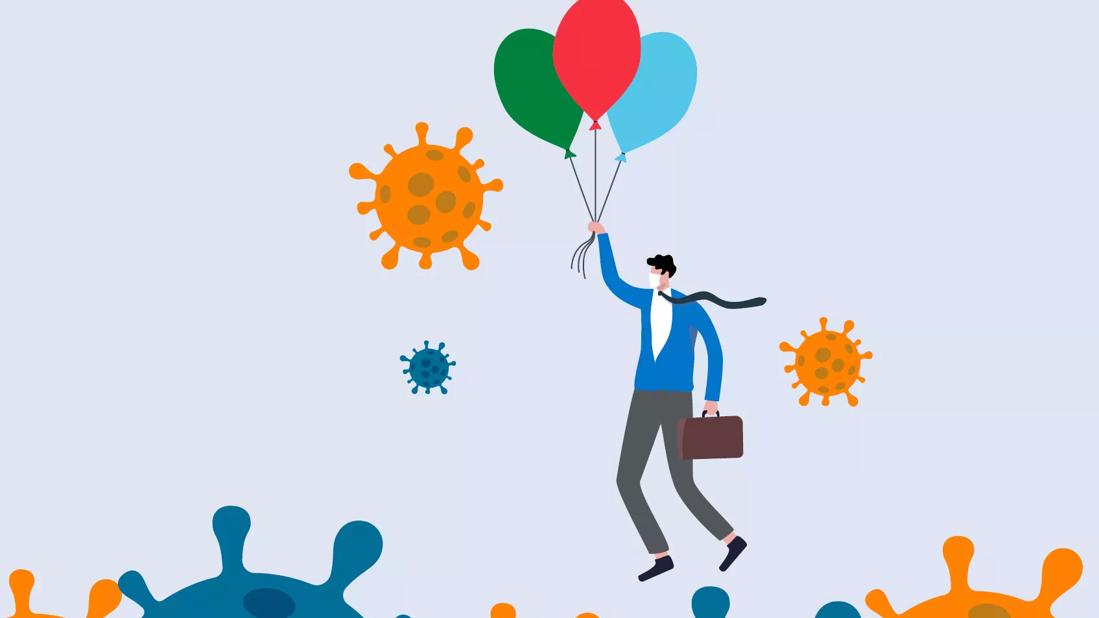COVID-19 reinfections are on the rise, and there’s no limit to how many times you can get infected

Maybe you’ve been there before. The body aches. The loss of smell and taste. The positive test.
Advertisement
Cleveland Clinic is a non-profit academic medical center. Advertising on our site helps support our mission. We do not endorse non-Cleveland Clinic products or services. Policy
Maybe you thought you were done with COVID-19. Maybe you thought it was like chickenpox — if you’ve had it once, you’re immune forever, and you can put your worries away for good.
Unfortunately, that’s not the case. You can get COVID-19 more than once. Many times, in fact.
“The thing to remember is that viruses are very smart,” says critical care physician Abhijit Duggal, MD. “The COVID-19 virus structure changes, and it can change enough that our body’s immune system is not able to recognize the virus as something it was exposed to in the past. Your chances for COVID-19 reinfection increase when the virus changes enough that your body doesn’t remember it.”
As the COVID-19 pandemic wears on, reinfection is becoming the new norm, with people contracting the virus again and again. We talked with Dr. Duggal about how many times you can be infected with COVID-19 and why reinfection happens.
You might wonder how many times can you get COVID-19. That line from the movie Mean Girls comes to mind: The limit does not exist.
“Think about it this way: There’s no set number of how many colds you can get over your lifetime. I can’t say, ‘I’ve gotten a cold 10 times in my lifetime. There’s no way I’m not going to get it 11 times,’” Dr. Duggal explains. “The same is true of COVID-19. If you get exposed to a new variant, the risk of reinfection is always there.”
Advertisement
The reason is that while some viruses, like chickenpox, stay relatively the same over time, the COVID-19 virus is more like the flu virus. It’s a master of self-preservation and mutation.
After your body successfully fights off a variant of COVID-19, or gets the COVID-19 vaccine, your immune system can spot the offending virus when it tries to come back. It kicks out the virus like a bouncer on patrol for a troublesome club-hopper.
If that customer returns wearing sunglasses and a fake mustache a few months later, though, the bouncer may not recognize them and will open up the velvet ropes to usher them into the party. That’s how it is when the COVID-19 virus mutates. It changes itself just enough to slip by your body’s defenses undetected.
If you’re vaccinated and following all the recommended safety measures, Dr. Duggal says your risk of reinfection is lower. And thankfully, if you get COVID-19 again, it’s likely going to be less severe. “But we have to be mindful that having been infected doesn’t give you immunity from other variants. You can’t bank on that,” he adds.
Research on when you can be reinfected with COVID-19 is mixed. Some studies have suggested that after you have been infected with COVID-19, you may be protected from reinfection for 10 months or more. Others say immunity following recovery from COVID-19 only lasts a few weeks, if even that.
The Centers for Disease Control and Prevention (CDC) says research is ongoing to better understand how soon people can be reinfected.
The good news is that if you get COVID-19 again, it’s likely to be less severe than your first time around.
“We are seeing that in people who have a good, robust immunity — people who have been infected before and/or who are vaccinated and have strong immune systems — the severity of their disease from COVID-19 reinfection is pretty low,” Dr. Duggal says.
People who have weakened immune systems because of chronic illness, medication or other factors, however, may still be at a higher risk for more serious infections, even on a second or third go-round.
“There are so many variables that play into your chances for being reinfected with COVID-19,” Dr. Duggal says. “Prior COVID-19 exposure. Your vaccination status. The prevention measures you’re taking to protect yourself. The ways the virus itself is changing over time. It all plays into your risk of infection.”
Keeping yourself safe from getting COVID-19 again means remaining vigilant about taking precautions against virus transmission. Healthcare providers recommend getting the COVID-19 vaccine, in addition to measures like hand-washing, mask-wearing, social distancing and keeping your distance from sick people, Dr. Duggal says.
Advertisement
Having COVID-19 once doesn’t grant you lasting immunity from future infection. As long as the virus continues to mutate, new variants will emerge that can sneak past your body’s bouncers … er, immune system.
Advertisement

Sign up for our Health Essentials emails for expert guidance on nutrition, fitness, sleep, skin care and more.
Learn more about our editorial process.
Advertisement

Chilblain-like skin lesions and rashes are mild (and rare) complications of many viral infections, not just COVID-19

Most can return to work or school when they’re symptom-free for 24 hours

Covering your mouth when you cough and staying home when you’re sick are a couple ways to help keep yourself and others COVID-free

This vital nutrient supports your health, but its role in COVID-19 prevention and treatment isn’t proven

Studies have shown promising results, but additional research is needed

Infection and inflammation can cause you to lose your voice and have other voice changes until you’re fully healed

A COVID-19 infection can bring on depression or anxiety months after physical symptoms go away

Just like the flu, COVID-19 continues to evolve every year with new and smarter variants

Even small moments of time outdoors can help reduce stress, boost mood and restore a sense of calm

A correct prescription helps your eyes see clearly — but as natural changes occur, you may need stronger or different eyeglasses

Both are medical emergencies, but they are very distinct events with different causes